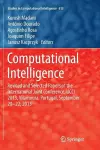
Computational Intelligence
5 contributors - Paperback
£109.99
Vladimir Haasz finished Czech Technical University (CTU) in Prague, Faculty of Electrical Engineering (FEE) in 1972 (branch "Technological Cybernetics"), and since that year he has been with Department of Measurement. In 1977 he obtained his Ph.D. degree and in 1991 he defended his habilitation thesis. In 1994 - 1995 he spent the half-year at ETH Zurich as a senior researcher. He was named as Full Professor of Measurement Technology in 1999. He managed the Department of Measurement at CTU-FEE 1997 - 2008 and 2011 - 2014. Vladimir Haasz is a member of TC 12 "Quantities and Values" of the Czech Institute of Standardization, of IMEKO (International Measurement Confederation) TC-4 - Measurement of Electrical Quantities, and of the editorial board of International Journal of Computing. He has been the honorary member of the Scientific Counsel of CTU 2011 - 2013. He is interested in the field of measuring systems of electrical quantities, sampling methods of measurement of non-harmonic waveforms, and in the last years especially in testing of dynamic quality of AD modules and their EMC. He gives lectures on the basic courses "Electrical Measurement and Instrumentation" and "Sensors and Measurement", and on the optional course "Advanced Instrumentation". Kurosh Madani graduated in fundamental physics in June 1985 from PARIS 7 - Jussieu University (Paris, France), he received his MSc. in Microelectronics and complex processors' architecture from University PARIS 11 (PARIS-SUD), Orsay, France, in September 1986. He received his Ph.D. in Electrical Engineering and Computer Sciences from University PARIS 11 (PARIS-SUD), Orsay, France, in February 1990. From 1989 to 1990, he worked as assistant professor at Institut d'Electronique Fondamentale (Institute of Fundamental Electronics) of PARIS 11 University and CNRS (National Center of Scientific Research), Orsay, France. In 1990, he joined Creteil-Senart Institute of Technology of University PARIS-EST Creteil (UPEC), Lieusaint, France, where he worked from 1990 to 1998 as assistant professor. In 1995, he received the DHDR Doctor Hab. degree (senior research doctorate degree) from UPEC. Since 1998 he has been working as Chair Professor in Electrical Engineering of Senart Institute of Technology of UPEC. From 1992 to 2000 he was creator and head of DRN (Neural Networks Division) research group in LERISS laboratory of UPEC. From 2001 to 2004 he has been head of Intelligence in Instrumentation and Systems Laboratory of UPEC, located at Senart Institute of Technology. Director of SCTIC research division, one of the two research divisions of Images, Signals and Intelligent Systems Laboratory (LISSI / EA 3956) of UPEC from 2005 to 2009, he is Vice-director of LISSI since 2009. Concerning his research interests, he has worked on both digital and analog implementation of massively parallel processors arrays for image processing by stochastic relaxation, electro-optical random number generation, and both analog and digital Artificial Neural Networks (ANN) implementation. Author and coauthor of more than 300 publications in international scientific journals, books (Springer, Kluwer, etc.), international conferences' and symposiums' proceedings, he has been regularly invited as key-note and invited lecture by international conferences and symposiums (IEEE, IFAC, etc.). His current research interests include − Bio-inspired Artificial systems' modeling and implementation, − self-organizing, modular and hybrid neural based information processing systems and their software and hardware implementations, − Soft-Computing based complex applications: Automated negotiation mechanisms and systems, neural based fault detection and diagnosis systems, design and implementation of real-time neuro-control, etc. − humanoid robotics − collective robotics and collective intelligence − Intelligent machines & systems Since 1996 he is life-member (elected permanent Academician) of International Informatization Academy. Since 1997, he is also elected permanent Academician (life-member) of International Academy of Technological Cybernetics.